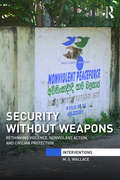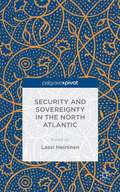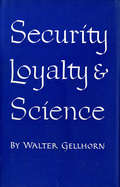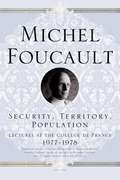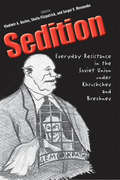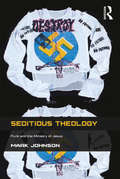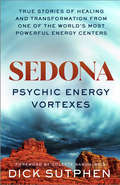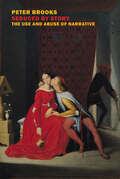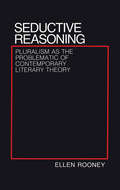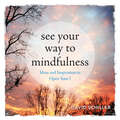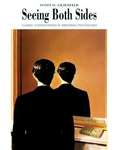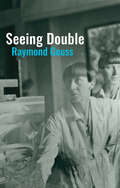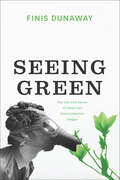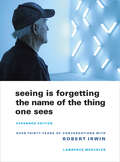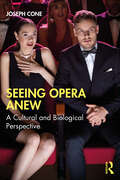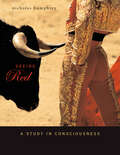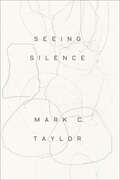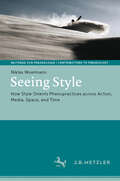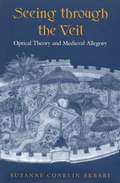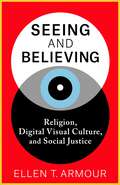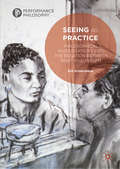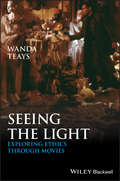- Table View
- List View
Security Without Weapons: Rethinking violence, nonviolent action, and civilian protection (Interventions)
by M. S. WallaceFew questions of global politics are more pressing than how to respond to widespread violence against civilians. Despite the efforts of Responsibility to Protect (R2P) proponents to draw attention away from exclusively military responses, debates on humanitarian intervention and R2P’s “Third Pillar” still tend to boil down to two unsatisfying options: stand by and “do nothing” or take military action to protect civilians – essentially using violence to stop violence. Accordingly – and given disagreement and uncertainty regarding moral claims, as well as the unpredictability of military effectiveness – this book asks: how can we counter violence ethically and effectively, taking action consistent with our particular moral commitments while also nurturing difference and enacting responsibility towards multiple others?After evaluating the pragmatic and ethical failings of military action, the book proposes nonviolent intervention as a third – unarmed, on-the-ground – option for protecting civilians during humanitarian crises. In the empirical section of the book, focusing on the discursive and psychological conditions enabling violence, Wallace analyses the mechanisms by which Nonviolent Peaceforce – an international NGO engaged in nonviolent intervention/ unarmed civilian peacekeeping (UCP) – was able to protect civilians and prevent violence, even if on a limited scale, in the broader context of Sri Lanka’s war/counterinsurgency in 2008.Both philosophically innovative and practically useful to those working in the field, the book contributes to a range of literatures and debates: from just war theory and poststructuralist ethics to nonviolent action and conflict transformation, and from humanitarian intervention, R2P, and civilian protection to strategic theory and discursive and psychological theories of violence.
Security and Defence: Ethical and Legal Challenges in the Face of Current Conflicts (Advanced Sciences and Technologies for Security Applications)
by Juan Cayón PeñaThis book aspires to face the challenge of analyzing with due academic rigor, always in the paradigm of security and advanced sciences, but without forgetting the ethical questions that our world raises every day. The work is divided into two main sections: the first section is focused on the cyber world, with not only technical but also legal derivations given the expansion of vulnerabilities and our technological dependence. The second section, with a more interdisciplinary nature, runs through undeniably topical issues such as territorial problems and the potential decline of the traditional States, the communicational impact of information management and false news, or the commitment to essential freedoms for the West. This book connects advanced technologies and ethical issues and includes discussions on recent crises such as COVID-19. It also provides an interdisciplinary view on the ethical issues for security technologies.
Security and Sovereignty in the North Atlantic
by Lassi HeininenThe North Atlantic continues to be an area of international strategic significance regionally and globally. This study explores the strong processes of sovereignty, as well as new independent states and micro-proto-states that are forming in the region.
Security, Defense Discourse and Identity in NATO and Europe: How France Changed Foreign Policy (New International Relations)
by Falk OstermannAnalyzing changes in the role and place of NATO, European integration, and Franco-American relations in foreign policy discourse under Presidents Jacques Chirac and Nicolas Sarkozy, this book provides an original perspective on French foreign policy and its identity construction. The book employs a novel research design for the analysis of foreign policies, which can be used beyond the case of France, by combining the discourse theory of the Essex School with Interpretive Policy Analysis to examine political ideas and how they are organized into a foreign policy identity. On these grounds, the volume undertakes a comparative analysis of parliamentary and executive discourse of President Chirac’s failed attempt at NATO reintegration in the 1990s, Sarkozy’s successful attempt in the 2000s, and the Libyan War. Ostermann depicts French foreign policy and identity as turning away from the European Union, atlanticizing, and losing its American nemesis. As a result, France uses a much more pragmatic, de-unionized, and pro-American strategy to implement foreign policy objectives than before. Offering a new and innovative explanation for a major change in French foreign policy and grand strategy, this book will be of great interest to scholars of NATO, European defense cooperation, and foreign policy.
Security, Loyalty, and Science (Cornell Studies in Civil Liberties)
by Walter GellhornBoth sides of a sensitive problem are assessed by Professor Gellhorn in this penetrating analysis of national security and its effect upon scientific progress.The costs and advantages of secrecy in certain areas of science and the conflict between national safety and individual rights in the administration of our federal loyalty program are presented; all the arguments are objectively weighed. The book answers such questions as: Can young scientists be well trained when publication and teaching are not free? Have we gone far enough-or too far-in avoiding "security risks" in important scientific establishments? How does the federal drive against "potentially disloyal" persons actually work? Do "fear of the smear" and crude methods discourage public service by American scientists?This study, a unit of an investigation of control of subversive activities supported by grants from the Rockefeller Foundation, is based upon two years of research and numerous field interviews of scientists, administrators, defense officials, and educators. Security, Loyalty, and Science is a volume in the series Cornell Studies in Civil Liberty, of which Robert E. Cushman is advisory editor.
Security, Privacy and Trust in the IoT Environment
by Zaigham MahmoodThe Internet of Things (IoT) is a network of devices and smart things that provides a pervasive environment in which people can interact with both the cyber and physical worlds. As the number and variety of connected objects continue to grow and the devices themselves become smarter, users’ expectations in terms of adaptive and self-governing digital environments are also on the rise. Although, this connectivity and the resultant smarter living is highly attractive to general public and profitable for the industry, there are also inherent concerns. The most challenging of these refer to the privacy and security of data, user trust of the digital systems, and relevant authentication mechanisms. These aspects call for novel network architectures and middleware platforms based on new communication technologies; as well as the adoption of novel context-aware management approaches and more efficient tools and devices.In this context, this book explores central issues of privacy, security and trust with regard to the IoT environments, as well as technical solutions to help address them. The main topics covered include:• Basic concepts, principles and related technologies• Security/privacy of data, and trust issues• Mechanisms for security, privacy, trust and authentication• Success indicators, performance metrics and future directions.This reference text is aimed at supporting a number of potential audiences, including• Network Specialists, Hardware Engineers and Security Experts • Students, Researchers, Academics and Practitioners.
Security, Territory, Population: Lectures At The College De France, 1977-1978
by Michel FoucaultMarking a major development in Foucault's thinking, this book takes as its starting point the notion of "biopower," studying the foundations of this new technology of power over populations.
Sedition: Everyday Resistance in the Soviet Union under Khrushchev and Brezhnev
by Sheila Fitzpatrick Vladimir A. Kozlov Sergei V. Mironenko Olga LivshinThis book explores Soviet prosecution records to tell the hidden story of ordinary citizens who were arrested for expressing discontent during the Khrushchev and Brezhnev years.
Seditious Theology: Punk and the Ministry of Jesus
by Mark JohnsonSeditious Theology explores the much analysed British punk movement of the 1970s from a theological perspective. Imaginatively engaging with subjects such as subversion, deconstruction, confrontation and sedition, this book highlights the stark contrasts between the punk genre and the ministry of Jesus while revealing surprising similarities and, in so doing, demonstrates how we may look at both subjects in fresh and unusual ways. Johnson looks at both punk and Jesus and their challenges to symbols, gestures of revolt, constructive use of conflict and the shattering of relational norms. He then points to the seditious pattern in Jesus' life and the way it can be discerned in some recent trends in theology. The imaginative images that he creates provide a challenging image of Jesus and of those who have relooked radically in recent years at what being a ’seditious’ follower of Christ means for the church. Introducing both a new partner for theological conversation and a fresh way of how to go about the task, this book presents a powerful approach to exploring the life of Christ and a new way of engaging with both recent theological trends and the more challenging expressions of popular culture.
Sedona, Psychic Energy Vortexes: True Stories of Healing and Transformation from One of the Worlds Most Powerful Energy Centers
by Dick SutphenRenowned psychic researcher Dick Sutphen reveals everything readers need to know about Sedona, a hot spot of powerful cosmic energies that can call in spiritual visions, past-life experiences, and healing.&“Sedona, Arizona—a place of awesome beauty and an extraordinary energy that is felt by every person wandering through its red-rock canyons. The first time I saw Sedona, in 1969, I knew this was a special place, not only because of its magnificent beauty but because of an undeniable spiritual vibration emanating throughout the area. Over the years I&’ve become convinced, through my own experiences and the experiences of others, and through extensive research and investigation, that the psychic energy here is greater than anywhere else in the country.&”Thousands of people have had incredible metaphysical experiences in Sedona, including direct contact with spirits, visions, and manifestations. Sedona lies on ley lines connecting to Stonehenge and other spiritual power places in the world, and is surrounded by four powerful energy centers, or vortexes, all within a few miles of each other. In this book, you will learn how the vortexes are charged and how they can affect you. You will hear firsthand testimonials from people who have explored the vortexes, and remarkable stories describing their profound, life-changing encounters. Complete directions to find each vortex are also included, as well as important warnings and safeguards you need to be aware of before exploring. You will learn how to test the energy, then activate and expand it to maximize the psychic potentials of your own vortex experience. Foreword by Colette Baron-Reid
Seduced by Story: The Use and Abuse of Narrative
by Peter BrooksIn this spiritual sequel to his influential Reading for the Plot, Peter Brooks examines the dangerously alluring power of storytelling.&“There&’s nothing in the world more powerful than a good story. Nothing can stop it. Nothing can defeat it.&” So begins the scholar and literary critic Peter Brooks&’s reckoning with today&’s flourishing cult of story. Forty years after publishing his seminal work Reading for the Plot, his important contribution to what came to be known as the &“narrative turn&” in contemporary criticism and philosophy, Brooks returns to question the unquestioning fashion in which story is now embraced as an excuse or explanation and the fact that every brand or politician comes equipped with one. In a discussion that ranges from The Girl on the Train to legal argument, Brooks reminds us that among the powers of narrative is the power to deceive.
Seductive Reasoning: Pluralism as the Problematic of Contemporary Literary Theory
by Ellen RooneySeductive Reasoning takes a provocative look at contemporary Anglo-American literary theory, calling into question the critical consensus on pluralism's nature and its status in literary studies. Drawing on the insights of Marxist and feminist critical theory and on the works of Althusser, Derrida, and Foucault, Rooney reads the pluralist’s invitation to join in a "dialogue" as a seductive gesture. Critics who respond find that they must seek to persuade all of their potential readers. Rooney examines pluralism as a form of logic in the work of E. D. Hirsch, as a form of ethics for Wayne Booth, as a rhetoric of persuasion in the books of Stanley Fish. For Paul de Man, Rooney argues, pluralism was a rhetoric of tropes just as it was, for Fredric Jameson, a form of politics.
See Your Way to Mindfulness: Ideas and Inspiration to Open Your I
by David SchillerSeeing, really seeing, is like meditation. In a world filled with distraction, seeing mindfully is a way to pay attention, to hit pause and find calm by focusing on what’s directly in front of us. See Your Way to Mindfulness is a gift book of inspiration and instruction to help readers open their eyes—and their “I’s.” <P><P>Written by David Schiller, author of the national bestseller The Little Zen Companion, it’s a collection of quotes, prompts, exercises, meditations—married with photographs and drawings that bring the words to life. The quotes are from artists, Buddhists, philosophers, poets, and more, all centered on the theme of how “The real voyage of discovery consists not in seeking new landscapes, but in having new eyes” (Marcel Proust). <P>The short, playful exercises and prompts—like Seeing in the Rain, Eye Spy with My Open I, Spend 30 Minutes Taking a Five-Minute Walk, Get Lost—are designed to disrupt routine and inspire readers to see for themselves. Some of the exercises involve drawing, writing, and taking photographs, opening a path to creativity as well as showing how to engage in the moment. <P>Think of it as the Zen of seeing—a new way to look at the world afresh and rediscover joy in the everyday.
Seeing Both Sides: Classic Controversies in Abnormal Psychology
by Scott O. LilienfeldAbnormal psychology is an enormously exciting, and yet at times greatly frustrating, discipline. What often makes the study of abnormal psychology frustrating to students is the multiplicity of opposing viewpoints on so many of the issues that occupy this field's center stage.
Seeing Double
by Raymond GeussThe world is never going to make complete sense to us, yet we find that conclusion almost impossible to accept. Can we live, and feel at home, in a world composed at best of incompatible fragments of meaning?This is the theme that runs through this collection of essays by Raymond Geuss. Drawing on a characteristically wide range of insights from moral and political philosophy, history, and aesthetics, he addresses topics such as knowledge (of self, the world, and others), language, the visual and the auditory, authority, hope, and the success and failure of life projects. He argues that, to get by in our bewildering world, we must embrace the virtue of ‘double vision’: that is, immersing ourselves in and learning the ways of the culture surrounding us, even as we feel alienated from it. Together the essays explore some of the consequences of abandoning the idea of a unitary view of the world, while at the same time trying to avoid quietism.Seeing Double is a compelling collection of work by one of the world’s most versatile and creative philosophers.
Seeing Green: The Use and Abuse of American Environmental Images
by Finis DunawayThis “smart, highly readable book” examines how the iconography of environmentalism has help shape—and limit—popular discourse (American Studies).American environmentalism is defined by its icons: from the “Crying Indian” who shed a tear over litter to Al Gore’s documentary An Inconvenient Truth. These kinds of images helped make environmental consciousness central to American culture. And yet these same images obscured critical environmental truths. Finis Dunaway examines this dual role in Seeing Green.Considering a wide array of images—from print magazines and television news to political posters and even cartoons—Dunaway shows how popular environmentalism has been entwined with mass media spectacles of crisis. He focuses on key moments in which media images provoked environmental anxiety while prescribing limited forms of action. Moreover, he shows how the media blamed individual consumers for environmental degradation and thus deflected attention from corporate and government responsibility.Ultimately, Dunaway argues, iconic images have impeded efforts to realize—or even imagine—sustainable visions of the future. Generously illustrated, this innovative book examines both the history of environmentalism and the power of the media to shape our politics.
Seeing Is Forgetting the Name of the Thing One Sees: Expanded Edition
by Lawrence WechslerWhen this book first appeared in 1982, it introduced readers to Robert Irwin, the Los Angeles artist "who one day got hooked on his own curiosity and decided to live it." Now expanded to include six additional chapters and twenty-four pages of color plates, Seeing Is Forgetting the Name of the Thing One Sees chronicles three decades of conversation between Lawrence Weschler and light and space master Irwin. It surveys many of Irwin's site-conditioned projects—in particular the Central Gardens at the Getty Museum (the subject of an epic battle with the site's principal architect, Richard Meier) and the design that transformed an abandoned Hudson Valley factory into Dia's new Beacon campus—enhancing what many had already considered the best book ever on an artist.
Seeing Opera Anew: A Cultural and Biological Perspective
by Joseph ConeWhat people ultimately want from opera, audience research suggests, is to be absorbed in a story that engages their feelings, even moves them deeply, and that may lead them to insights about life and, perhaps, themselves. How and why can this combination of music and drama do that? What causes people to be moved by opera? How is it that people may become more informed about living and their own lives? Seeing Opera Anew addresses these fundamental questions. Most approaches to opera present information solely from the humanities, providing musical, literary, and historical interpretations, but this book offers a “stereo” perspective, adding insights from the sciences closely related to human life, including evolutionary biology, psychology, anthropology, and neuroscience. It can be hoped that academic specialists less familiar with the science will find points of interest in this book’s novel approach, and that open-minded students and inquisitive opera-goers will be stimulated by its “cultural and biological perspective.”
Seeing Red: A Study in Consciousness (Mind/Brain/Behavior Initiative)
by Nicholas Humphrey“A brilliantly inventive account of the evolution of consciousness, the best yet” (Paul Broks, Prospect).“Consciousness matters. Arguably it matters more than anything. The purpose of this book is to build towards an explanation of just what the matter is.” Nicholas Humphrey begins this compelling exploration of the biggest of big questions with a challenge to the reader, and himself. What’s involved in “seeing red”? What is it like for us to see someone else seeing something red?Seeing a red screen tells us a fact about something in the world. But it also creates a new fact—a sensation in each of our minds, the feeling of redness. And that’s the mystery. Conventional science so far hasn’t told us what conscious sensations are made of, or how we get access to them, or why we have them at all. From an evolutionary perspective, what’s the point of consciousness? Humphrey offers a daring and novel solution, arguing that sensations are not things that happen to us, they are things we do—originating in our primordial ancestors’ expressions of liking or disgust. Tracing the evolutionary trajectory through to human beings, he shows how this has led to sensations playing the key role in the human sense of Self.The Self, as we now know it from within, seems to have fascinating other-worldly properties. It leads us to believe in mind-body duality and the existence of a soul. And such beliefs—even if mistaken—can be highly adaptive, because they increase the value we place on our own and others’ lives. “Consciousness matters,” Humphrey concludes with striking paradox, “because it is its function to matter. It has been designed to create in human beings a Self whose life is worth pursuing.”Praise for Seeing Red“A wonderful amalgam of science, philosophy, and art. [Seeing Red] is based on deep knowledge of visual processing by the brain and poetic understanding of human experience. This is a remarkable achievement.” —Richard Gregory, Emeritus Professor of Neuropsychology, University of Bristol, and editor of The Oxford Companion to the Mind“A brief, brilliant, and wonderfully lucid contribution to consciousness studies. By combining empirical scientific method, evolutionary theory, and a sensitive appreciation of the arts, Nicholas Humphrey argues plausibly that the “hard problem” of consciousness—the difficulty of explaining the connection between the material brain and the phenomenon of individual selfhood—may itself be the answer to a bigger question: what makes us human?”—David Lodge, author of Consciousness and the Novel: Connected Essays“Illustrating his argument with the musings of poets and painters, Humphrey stylishly inspires curiosity about consciousness.” —Gilbert Taylor, Booklist
Seeing Silence
by Mark C. Taylor“To hear silence is to find stillness in the midst of the restlessness that makes creative life possible and the inescapability of death acceptable.” So writes Mark C. Taylor in his latest book, a philosophy of silence for our nervous, chattering age. How do we find silence—and more importantly, how do we understand it—amid the incessant buzz of the networks that enmesh us? Have we forgotten how to listen to each other, to recognize the virtues of modesty and reticence, and to appreciate the resonance of silence? Are we less prepared than ever for the ultimate silence that awaits us all? Taylor wants us to pause long enough to hear what is not said and to attend to what remains unsayable. In his account, our way to hearing silence is, paradoxically, to see it. He explores the many variations of silence by considering the work of leading modern and postmodern visual artists, including Barnett Newman, Ad Reinhardt, James Turrell, and Anish Kapoor. Developing the insights of philosophers, theologians, writers, and composers, Taylor weaves a rich narrative modeled on the Stations of the Cross. His chapter titles suggest our positions toward silence: Without. Before. From. Beyond. Against. Within. Between. Toward. Around. With. In. Recasting Hegel’s phenomenology of spirit and Kierkegaard’s stages on life’s way, Taylor translates the traditional Via Dolorosa into a Nietzschean Via Jubilosa that affirms light in the midst of darkness. Seeing Silence is a thoughtful meditation that invites readers to linger long enough to see silence, and, in this way, perhaps to hear once again the wordless Word that once was named “God.”
Seeing Style: How Style Orients Phenopractices across Action, Media, Space, and Time (Beiträge zur Praxeologie / Contributions to Praxeology)
by Niklas WoermannHow do social practices prefigure experiences, and how does embodied experience organize the performance of practices? This book suggests that the classic concept of style offers a fresh answer to the question how doings and sayings are linked into practice bundles. Based on a rich ethnographic study of the visual practices of the German-speaking freeskiing subculture, this work develops a theory of phenopractices, or embodied cultural practices dedicated to apprehending and expressing style. Focusing on the visual dimension, it extends the thought of Garfinkel and Schatzki using recent insights from science and technology studies and research at the intersection of neuroscience and phenomenology. This offers a new perspective on fundamental practice-theoretical questions about the nature of practice elements, social order in the context of rules and regularity, or action and practical intelligibility. Each chapter discusses and develops foundational concepts such as time, space, action, emotion, or perception based on an analysis of freeskiing practices such as planning a route in the backcountry, testing a new ski model, or judging freestyle contests. The central argument is that cultural styles of conduct are not only symbolic structures, but a functional resource which organizes situational intelligibility and thus enables social order based on aligned and managed embodied routines. Because the stabilization, dissemination, and evolution of such styles happens via different media, practice change is primarily influenced by media rather than symbolic, rational, or functional needs or ends. A rich ethnography and provocative theoretical argument of interest to anyone working on contemporary practice thought, advancing phenomenology, the sociology of vision, lifestyle sports, media, or practice evolution.
Seeing Through the Veil
by Suzanne Conklin AkbariDuring the later Middle Ages, new optical theories were introduced that located the power of sight not in the seeing subject, but in the passive object of vision. This shift had a powerful impact not only on medieval science but also on theories of knowledge, and this changing relationship of vision and knowledge was a crucial element in late medieval religious devotion. In Seeing through the Veil, Suzanne Conklin Akbari examines several late medieval allegories in the context of contemporary paradigm shifts in scientific and philosophical theories of vision.After a survey on the genre of allegory and an overview of medieval optical theories, Akbari delves into more detailed studies of several medieval literary works, including the Roman de la Rose, Dante's Vita Nuova, Convivio, and Commedia, and Chaucer's dream visions and Canterbury Tales. The final chapter, 'Division and Darkness,' centres on the legacy of allegory in the fifteenth century. Offering a new interdisciplinary, synthetic approach to late medieval intellectual history and to major works within the medieval literary canon, Seeing through the Veil will be an essential resource to the study of medieval literature and culture, as well as philosophy, history of art, and history of science.
Seeing and Believing: Religion, Digital Visual Culture, and Social Justice
by Ellen T. ArmourSocial media platforms are often denounced as “bubbles” or “echo chambers.” In this view, what we see tends to reinforce what we already believe, and what we already believe shapes what we see. Yet social movements such as Black Lives Matter rely heavily on the widespread dissemination of digital photographs and videos through social media. In at least some cases, visual images can challenge normative and normalized ways of grasping the world and prompt their viewers to see differently—and even bring people together.Seeing and Believing marshals religious resources to recast the significance of digital images in the struggle for social justice. Ellen T. Armour examines what distinguishes digital photography from its analogue predecessor and places the circulation of digital images in the broader context of virtual visual cultures. She explores the challenges and opportunities that visually saturated social media landscapes present for users and organizers. Despite the power of digital platforms and algorithms, possibilities for disruption and resistance emerge from how people engage with these systems. Armour offers ways of seeing drawn from Christianity and found in other religious traditions to help us break with entrenched habits and rethink how we engage with the images that grab our attention. Developing theological perspectives on the power and peril of photography and technology, Seeing and Believing provides suggestions for navigating the new media landscape that can spark what Armour calls “photographic insurrection.”
Seeing as Practice: Philosophical Investigations into the Relation Between Sight and Insight (Performance Philosophy)
by Eva SchuermannThis study provides an overview of philosophical questions relating to sight and vision. It discusses the intertwinement of seeing and ways of seeing against the background of an entirely different theoretical framework.Seeing is both a proven means of acquiring information and a personality-specific way of disclosing the apparent, perceptible world, conditioned by individual and cultural variations. In a peculiar way, the eye holds a middle position between inside and outside of the self and its relations towards itself and others. This book provides a way out of false alternatives by offering a third way with reference to concrete cases of aesthetical and ethical experiences. It will be of particular interest to scholars of the phenomenology and philosophy of perception and it will be valuable to students of philosophy, cultural studies and art.
Seeing the Light
by Wanda TeaysSeeing the Light: Exploring Ethics Through Movies is an engaging and innovative approach to the study of philosophy and the development of moral reasoning skills. Features broad coverage of topics in ethics and moral reasoningOffers an innovative and imaginative approach to showing relevance of movies for ethical reflectionDraws on a diverse selection of popular movies, foreign films, and documentaries to illustrate ethical dilemmas and character development on the big screen that has application to our livesPresents coverage of major ethical theories ranging from Ethical Egoism and Cultural Relativism to Utilitarianism, Kantian Ethics, Rawls' Justice Theory, Aristotle's Virtue Ethics, and Feminist Ethics Demonstrates how film is a powerful vehicle for sharpening skills in analysis and moral reasoningIncludes accompanying website
